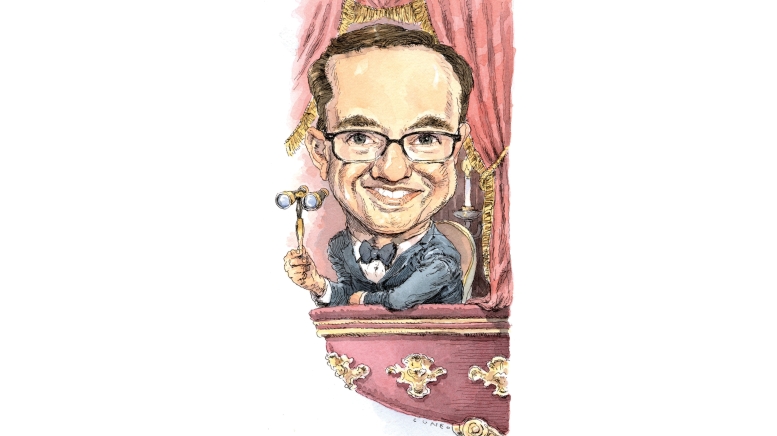Notable: New general director of Washington National Opera at the Kennedy Center, responsible for overseeing staff, fundraising, and collaborating on programming with artistic director Francesca Zambello; recipient of various community outreach awards in St. Louis, where he headed the Opera Theater of St. Louis; chair of Opera America
Career: Started in Washington July 1; general director in St. Louis, 2008-18; previously in artistic and management positions with Glimmerglass Opera in Cooperstown, New York, and the New York City Opera
Education: A.B., English (Phi Beta Kappa)
Personal: Lives in Washington, D.C., with wife Kara and three young children
“Running an opera company depends on having a really sound fiscal structure. My job is to assure we have enough funding to support artistic excellence that will be embraced by our audiences.”
“We joke in our house that my wife, a psychologist with the U.S. Department of Veterans Affairs, helps real people with real problems, while I work in a place where we make up problems and sing about them.”
“I bought my first opera CD at a Dartmouth Bookstore sale just to annoy my roommates.”
“When I did my language study abroad in Siena, I listened to The Marriage of Figaro almost every day because I was so frustrated trying to learn Italian. I found I could measure my progress by how much more I understood every day.”
“Singing a leading role in a College operetta gave me just enough experience of the difficulty and terror of depending on your throat in front of an audience. To do what I do now, you have to have a deep love, respect, and sympathy for singers.”
“As managing director of the Gotham Chamber Opera, I was the only full-time employee. I would laugh because the marketing department and artistic department were in an argument, but I was both of them.”
“The story about the impossibility of the economic model of opera is a long one. Opera requires the human resources of a major orchestra and a major theater company on top of each other—and all the language coaches you need.”
“Opera companies are often more different than alike, because each caters to its own market. Some audiences prefer the classics. Putting on new work means commission fees to composers, workshopping the piece, and building the community relationships needed to make it successful.”
“Starting to listen to opera is like starting to drink wine. You can be intimidated by the choices and expertise you feel you’re supposed to have, or you can simply enjoy it.”
“Opera rewards its fans by being complex. Often it is metaphorical—almost ridiculous—and has nothing to do with the real world, but if you allow yourself to suspend disbelief, you can be captivated.”
“There is something powerful about people sitting in a space together and being moved by the same story. The Greeks invented theater and democracy at the same time.”
“The purpose of artistic expression is to reveal the common humanity across our differences even when what we’re talking about are the same sensitive issues that divide us in a political context.”
Illustration by John Cuneo




